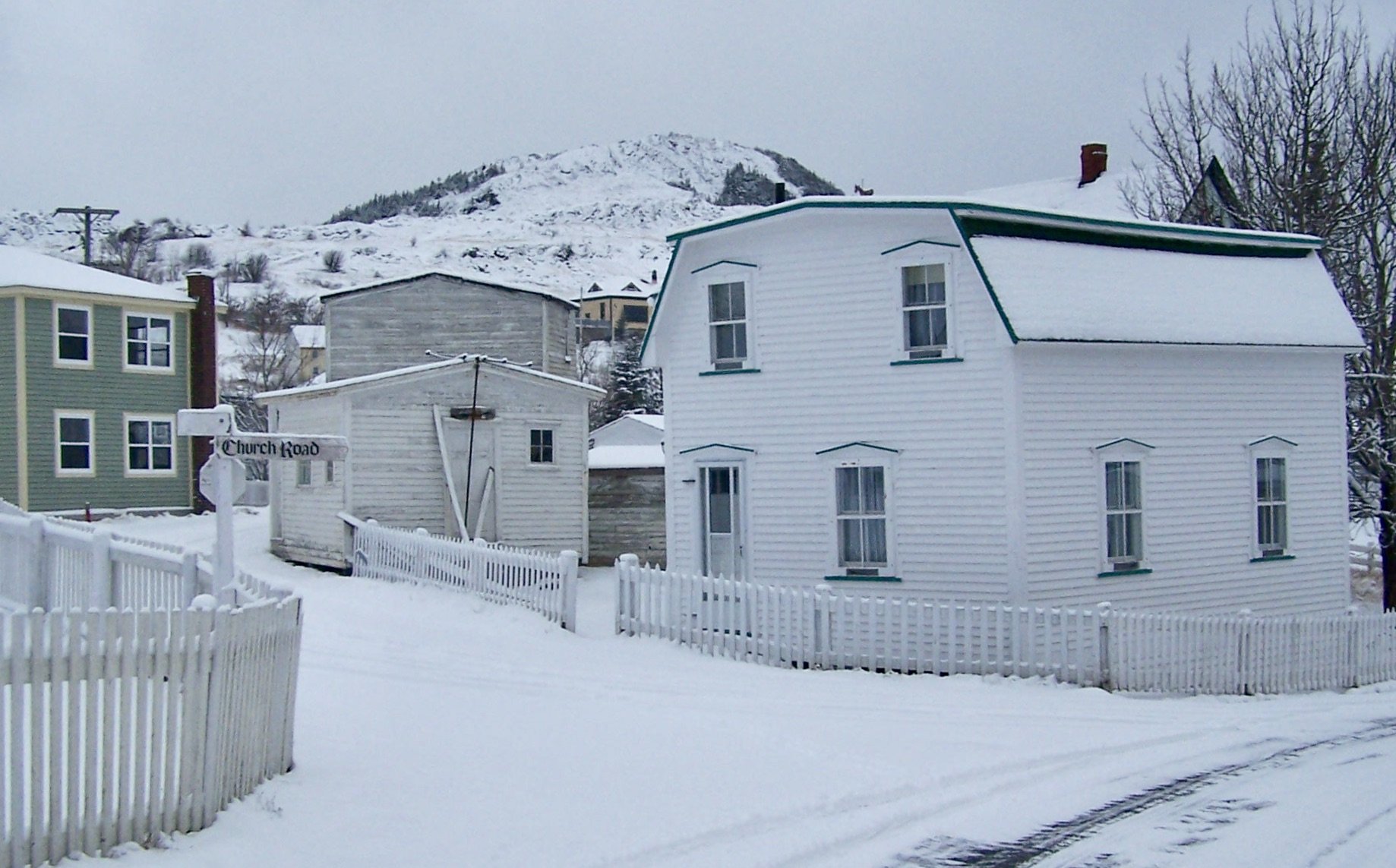What is the Heck Tibb’s Eve?
Lobster pot Christmas Tree, Salvage, NL
In Newfoundland, Tibb’s Eve (or Tib’s Eve) is the name given to December 23rd. It’s sort of the unofficial start of the Christmas season.
The day is recognized in different ways by different people, but for many it is a day to party with friends. It has become (and probably always has been, to some degree) tied to drinking. These days bars have embraced the pseudo-holiday and compete to attract customers. I suspect finding patrons is not especially difficult.
By December 23rd many Newfoundlanders have returned to their home communities for Christmas — college and university students, people working ‘turn arounds’ and others who have left home are back. People are looking to reconnect with friends before attention shifts to family on Christmas Eve and Christmas Day.
Tibb’s Eve isn’t a party for all Newfoundlanders, of course.
St. John’s NL
Tibb’s Eve customs vary from community-to-community and family-to-family; while for some it is one of the biggest party days of the year, for others it’s a time for family potlucks and, for others it’s a complete non-event.
The variation makes sense, really —
It’s a day that doesn’t exist.
The Mysterious Beginning of Tibb’s Eve
A Note on Tibb, Tib and Tip…
Tibb’s Eve goes by several names and spellings. It can be Tibb’s Eve, Tib’s Eve, Tip’s Eve, Tipsy Eve and more. Throughout this post, I will mostly use Tibb’s Eve, but occasionally I will use other names and spellings to match the source material I reference.
The phrase Tibb’s Eve has been used in Newfoundland for a long time but, for most of its history, it had nothing to do with December 23rd.
It was a mythical day; a day that didn’t exist. The phrase came to Newfoundland with European settlers.
Dr. George Storey wrote an article titled the Dialect of Newfoundland in which he referenced Tibb’s Eve. “We have,” he wrote “such Anglo-Irish terms as … Tibbs’ Eve.” He defined the phrase as meaning “neither before nor after Christmas.“
Not quite the current understanding.
‘Neither before nor after Christmas’ didn’t mean December 23, obviously. It meant never. If something was said to be happening on Tibb’s Eve, it was a way of saying it would not happen at all.
The origin of the phrase is disputed but one theory is that the name Tib referred to a woman of ‘ill-repute,’ sometimes associated with debauchery.
There is some literary evidence to back that up.
The name ‘Tib’ appears in Shakespeare’s Pericles (Act 4, Scene 6):
Marina: Thou art the damned doorkeeper to every Coistrel that comes inquiring for his Tib
The website LitCharts provides a less-than-elegant modern-day translation of the line:
Marina: You’re the damned doorman who lets in every vagabond that comes looking for his slut
Tib wasn’t seen as any kind of saint… and that, according to the theory, is where the phrase Tibb’s Eve is born.
If there was to be a Tibb’s Eve it would probably be because Tib had been made a saint, and had a festival day. Given her reputation, that seemed unlikely; so unlikely, that nobody thought it would ever come to pass. Saying something would happen on Tibb’s Eve was a joking way of saying something would happen when Tib was made a saint.
There are many instances of the phrase Tibb’s/Tib’s Eve (meaning ‘never’) in old Newfoundland writings. The following clip appeared in a letter published in the St. John’s Daily Star in 1920:
“There is a possibility that the oft quoted ‘Tib’s Eve’ may breeze along one of these extra fine days... but there doesn’t seem to be any conceivable prospect that the Newfoundland Football League will ever present the medals that have been won...”
I think the author clearly means that Tibb’s Eve doesn’t exist. It may come along, they write, hinting that in 1920 the term was not widely understood to mean December 23rd.
Trinity, NL
The Journey to December 23rd
So, how did a day that would never come, arrive? And why did it land on December 23rd? And why in Newfoundland?
Truthfully, no one really knows… but there are stories. The most common of them work their way back to alcohol.
Tipsy to Tibb’s
The following story was recorded from an informant in Port aux Basque in 1973. It was recorded on a word slip for the Dictionary of Newfoundland English:
“I have heard that it is called Tipps Eve because when men used to put up their own homebrew etc. they wouldn’t drink it before Christmas but I guess most men would sneak a drink or two on this day because they felt that Christmas was close, and they probably got a bit tipsy, thus Tipps Eve.”
If we were going to take this as the origin story, then it would appear Tib (and the original meaning of Tibb’s Eve) had very little to do with it; tipsy maybe became Tipps and eventually Tibb’s. Perhaps.
I don’t know.
Trinity, NL
We probably shouldn’t be too quick to adopt this version of events, in any case. The same story appeared in a the article by William Kirwin called Folk Etymology: Remarks on Linguistic Problem-Solving and who does it (Language and Lore, 1985).
Kerwin points out that lots of Newfoundland words have been ‘defined’ and given etymological origins without much evidence. Kirwin ends with the caution that we should be “on our guard when we have a sudden hunch and are prompted to write out of thin air an etymological source for an interesting term.”
I wonder if Tibb has falsely attributed to Tipp/Tipsy because it sounds plausible; it’s not hard to imagine Tipp turned into Tibb because people were familiar with the old Anglo-Irish term. That’s the thing, though: it’s just imagination without substance.
What cannot be debated is the fact that December 23rd still goes by the name Tipsy Eve in some parts of Newfoundland. Not, that that clarifies the issue — Tibb’s could have evolved into Tipsy just as easily as the reverse.
Neither Before Nor After
Earlier in this post, I pointed out that George Story defined Tibb’s Eve as a day that was “neither before nor after Christmas, i.e. never.” The fun, folksy definition created a sort of semantic link to the holidays. It doesn’t, in any way, explain how December 23rd became Tibb’s Eve but it does drop a tantalizing breadcrumb — if Tibb’s Eve were going to have a calendar date, by virtue of the definition the December holidays were already top of mind.
It’s a mystery.
When Did Tibb’s Eve Become ‘A Thing’?
Not only is the origin of Tibb’s Eve on December 23rd a mystery, it’s not clear when the belief began… though it seems it’s not an ancient tradition.
In my reading (which was hardly exhaustive, and mostly in the MUN Digital Archives) I’ve found no reference to December 23rd as Tibb’s Eve until the second half of the 20th century, after that references begin to appear.
Folklorists peg Tibb’s Eve as a post World War 2 invention.
Subjectively, I think the tradition has exploded in popularity over the last two decades. I’ve always known December 23rd as Tibb’s Eve, but it was not the pop cultural phenomenon in my youth that it is now.
More Tibb’s Questions than Tibb’s Answers
There is much mystery when it comes to the Tibb’s Eve tradition, and because of that, much room to define the day away from hard and fast customs. That may be one of the reasons people mark the day with such variation.
Personally, I like the idea that it’s a day to reconnect with friends, celebrate shared histories, and maybe have a drink or three.
I’m not saying December 23rd descends into debauchery but I can’t help but think that, here in Newfoundland, the ‘Never-Gonna-Be-Saint Tib’ may have gotten the last laugh.
Worthy of sainthood or not, she finds her name attached to a day, and it’s just the sort of day she might have enjoyed — one that’s marked with a party on George Street.
Tibb’s Eve Podcast
Check out the podcast for more Tibb’s Eve talk and a healthy dose of Newfoundland Christmas slush.
-
The Dialects of Newfoundland, George Story, Book of Newfoundland
Notes on the Dialect of the People of Newfoundland, Journal of American Folklore
William Kirwin, Folk Etymology:Remarks on Linguistic Problem-Solving and who does it, Language and Lore, Vol. 4, No. 2, 1985
More Than Mummers, Philip Hiscock, Newfoundland Quarterly, 2002
Tibb’s Eve, Larry Dohey, Archival Moments
St. John’s Daily Star, April 15, 1920








Stranded on a frozen rock at Christmas, the Queen of Swansea castaways faced starvation, despair—and unimaginable choices.